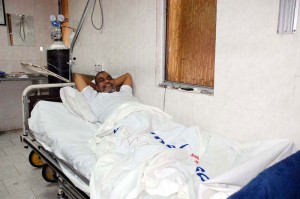Following the dramatic reconciliation between the two leading parties (CCM and CUF) Zanzibar MP’s have lost little time in pursuing in the Zanzibar House of Assembly the idea of some sort of coalition government.
A private motion was first presented by CUF leader in the House Abubakar Khamis Bakary (CUF) and debated for two days before it was passed. The government was asked to prepare necessary changes in the Zanzibar constitution to allow for the formation of a government of national unity. CCM’s representatives were at first hesitant but later came round and supported the preparation of a Bill.
Similarly, on January 28, CUF, which had been opposed to the idea of holding a referendum as proposed by CCM, changed its mind.
The proposed Bill would therefore provide for a referendum to be held, probably before the next elections, on whether to go ahead with plans for a ‘government of national unity.’
The exact form of this government of ‘national unity’ was the subject of further debate. It could mean a ‘coalition’ or some other form of co-operation between MP’s. Leaders of smaller parties, which have no MP’s in the Zanzibar House, complained about being excluded.
CCM’s National Executive Committee (NEC) seemed to indicate that it would like to avoid such words as ‘coalition’ and ‘government of national unity’ in the proposed Bill. Instead it talked instead of an ‘inclusive government.’ One MP said that this meant that the government would co-opt members from opposition parties that gained more than 10% of the votes in an election.
No time to lose
The pace quickened. Zanzibar Attorney General Idd Hassan Pandu expressed confidence that by July 2010 the structure of a coalition government would be known. While being interviewed on TBC he said: “My office has already received a draft for the coalition, but the Zanzibar Electoral Commission (ZEC) will have to conduct a referendum and declare the result within three months.”
Maalim Seif falls ill
As the debate continued on these issues, there was concern when one of the two architects of the reconciliation between the two main parties, CUF Secretary General Seif Shariff Hamad (or Maalim Seif as he is best known in Zanzibar) – the other architect is Zanzibar President Amani Karume – was suddenly taken ill at the International Airport in Dar while waiting for a connecting flight to Oman. However, the problem was soon diagnosed as bronchitis and he went back to work shortly afterwards.
Registration of voters
Just before this, Hamad had had his third meeting with President Karume on the registration of voters which had been going very slowly in Zanzibar and had been a serious bone of contention between the parties following allegations that the 2000 and 2005 elections had been fixed in favour of the ruling party – Guardian.
Secret revealed
During an interview with the Guardian on Sunday, CUF National Chairman Prof. Ibrahim Lipumba revealed what happened before the historic reconciliation meeting between the CCM and CUF leaders in November 2009 which had caused so much surprise at the time.
Extracts: ‘After years of hostility between the two parties, it was the friendship between two politicians, CCM stalwart Hassan Nassor Moyo and the CUF founder Secretary General, Shaaban Khamis Mloo, that led the way to the accord…. It might not have happened had it not been for this friendship… the process started from March 15, 2009 when Mloo died. “From the cemetery after the burial, we all went to his home, where Mzee Moyo looked agonised at the departure of his companion, and wondered aloud why political rivalry should continue in the Isles….We witnessed how gravely pained the old man was, and decided that something should be done… it was from then that the roadmap to the ‘maridhiano’ as the accord is now known, was crafted”…. Mzee Mloo had been a staunch CCM member, holding many high offices before the introduction of political pluralism in 1992 when he was one of the pioneer leaders of the opposition….the friendship between Moyo and Mloo was not affected by their political differences. … Taking the cue from Mzee Moyo, one of the pioneers of the 1964 Zanzibar Revolution and a member of the Zanzibar Revolutionary Council from its inception, the rival parties realised that it was pointless to continue to stoke the fires of rivalry and to opt instead for reconciliation.’

